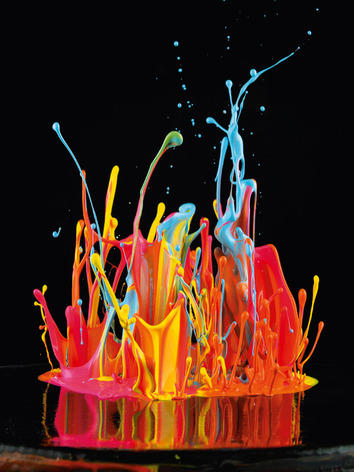Scientific Network on "Field-Configuring Events"
Untitled (image use kindly permitted by artist)
Bildquelle: Martin Klimas http://www.martin-klimas.de/
"For researchers fairs and festivals are (...) naturally occurring socio-economic ‘laboratories’ with two distinguishing features that make them interesting: they are contexts where all resources relevant to the field’s strategies are valued in relationship to each other, and they are contexts where actors use resources entrepreneurially to create and obtain other resources that further these strategies." (Lampel, 2011: 334)
"These events are microcosms of nascent technologies, industries, and markets. They are places where business cards are exchanged, networks are constructed, reputations are advanced, deals are struck, and standards are set." (Meyer et al., 2005: 467)
"(...) international conferences are important catalysts of change, especially as organizations and governments struggle to develop global solutions to complex problems (...)" (Hardy & Maguire, 2010: 1365)
Welcome to the Website of the Scientific Network “Field-Configuring Events: Time, Space, Relations”!
This Scientific Network is supported by a grant of the German Research Foundation (Deutsche Forschungsgemeinschaft) and comprises scholars interested in researching "field-configuring events". Field-configuring events are "temporary social organizations" (Lampel & Meyer, 2008) such as conferences, trade shows or festivals that assemble diverse members of an organizational field in a bounded time and space to exchange information or coordinate activities. Such events have been research from different disciplinary perspectives, particularly business studies, sociology, and economic geography, because they play an important role in structuring professional, technological, or regional fields. Our network aims to foster an exchange between these different disciplinary perspectives in order to develop our current theoretical understanding of the functioning of field-configuring events and to discuss different methodological possibilities for researching these venues. Field-configuring events are not only fruitful sites for conducting interviews with diverse field actors and for observing their interaction, they are typically also well-documented and, if they take place periodically, allow longitudinal analyses of, e.g., changing themes and actor constellations in organizational fields (cf. e.g. Anand & Watson, 2004; Schüßler et al., 2013).
Each meeting of our Scientific Network is dedicated to a specific theme. While the 1st Workshop establishes the groundwork for an interdisciplinary discussion on field-configuring events by, for instance, comparing the concept to the notion of temporary or cyclical clusters developed in economic geography, the 2nd Workshop focuses on the role of time and temporality in constituting and mediating the mechanisms underlying field-configuring events. The 3rd Workshop is framed around the relational effects of field-configuring events, exploring both theoretical arguments and possibilities for using network analytic methods when researching field-configuring events. The 4th Workshop of the research network is focused on space - i.e. the spatial structuring and embeddedness of events as well as processes of spacing during events. Through these workshops, the network seeks to advance current theorizing on field-configuring events across disciplinary boundaries.
The network is organized by Prof. Dr. Elke Schüßler (Johannes Kepler University Linz; formerly Freie Universität Berlin) and supported by Prof. Dr. Gordon Müller-Seitz (TU Kaiserslautern) who co-initiated the network. Further members are Dr. cand. Constanze Engelbrecht (HafenCity University Hamburg), Prof. Dr. Katharina Hölzle (Universität Potsdam), Dr. Bastian Lange (Humboldt Universität Berlin), Dr. Uli Meyer (Technische Universität München, formerly Technische Universität Berlin), Prof. Dr. Guido Möllering (Universität Witten-Herdecke, formerly Jacobs University Bremen), Dr. Simone Schiller-Merkens (Max-Planck-Institut für Gesellschaftsforschung Köln) und Dr. Joachim Thiel (HafenCity University Hamburg).
References
Anand, N., & Watson, M. R. 2004. Tournament rituals in the evolution of fields: The case of the Grammy Awards. Academy of Management Journal, 47: 59-80.
Hardy, C., & Maguire, S. 2010. Discourse, field-configuring events, and change in organizations and institutional fields: Narratives of DDT and the Stockholm Convention. Academy of Management Journal, 53: 1365-1392.
Lampel, J. 2011. Converting values into other values: Fairs and festivals as resource valuation and trading events. In B. Moeran & J. Strandgaard Pedersen (Eds.), Negotiating values in the creative industries: Fairs, festivals and competitive events: 334-347. Cambridge, U.K.: Cambridge University Press.
Lampel, J., & Meyer, A. D. 2008. Guest editors' introduction: Field-configuring events as structuring mechanisms: How conferences, ceremonies, and trade shows constitute new technologies, industries, and markets. Journal of Management Studies, 45: 1025-1035.
Meyer, A. D., Gaba, V., & Colwell, K. A. 2005. Organizing far from equilibrium: Nonlinear change in organizational fields. Organization Science, 16: 456-473.
Schüßler, E./Rüling, C.-C./Wittneben, B. (2014): On melting summits: The limitations of field-configuring events as catalysts of change in transnational climate policy. Academy of Management Journal, 57, 140-171.
